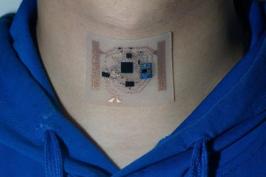Recent News

Q&A: In ChatGPT we trust?
Combining artificial intelligence (AI) and online search engines may make AI more trustworthy and search results easier to use, according to Penn State researchers.

Competition highlights believable fake news created with generative AI tools
Penn State’s Center for Socially Responsible Artificial Intelligence announced the winners of its first-ever “Fake-a-thon.” The competition, held April 1-5, invited Penn Staters to use generative AI tools like ChatGPT to create fake news stories that then underwent scrutiny for clues during the two-part challenge.

Contest invites Penn Staters to write believable fake news with generative AI
Starting April Fools’ Day, Penn State’s Center for Socially Responsible Artificial Intelligence (CSRAI) will host “Fake-a-thon,” a five-day competition to better understand the role of generative AI in the creation and detection of fake news. The event challenges participants to use generative AI to write believable fake news stories and is open to all members of the University community with a valid Penn State email address.

Media Mention: "How we can make AI less biased against disabled people"
AI has become omnipresent in nearly every industry, but its inherent biases often go unaddressed in meaningful ways. For people with disabilities, that can be a significant problem.
This article from Fast Company dives into the issue, citing recent research from CSRAI Student Affiliates Pranav Narayanan Venkit and Mukund Srinath, and CSRAI Affiliate and College of Information Sciences and Technology Assistant Professor Shomir Wilson.

Media Mention: "Pennsylvania's Path to Regulate Artificial Intelligence"
Pennsylvania has yet to pass any laws regulating artificial intelligence, but legislators are crafting resolutions they hope will help the state to enact informed legislation when the time comes.
In this article from Erie News Now, Daryl Lim, CSRAI affiliate and H. Laddie Montague Jr. Chair in Law at Dickinson Law, laid out several priorities a committee should take when regulating AI.

Predictive model detects potential extremist propaganda on social media
The militant Islamic State group, or ISIS, lost its physical territory in 2019, but it remains an active force on social media, according to researchers from the Penn State College of Information Sciences and Technology, who set out to better understand the group’s online strategies. The research team includes CSRAI student affiliate Younes Karimi.

Media Mention: "Why You Might Want Alexa or Siri to Sound More Like You"
A recent research study suggests that consumers would like and trust AI assistants more if it reminds them of themselves.
In this article from The Wall Street Journal, S. Shyam Sundar, CSRAI director and James P. Jimirro Professor of Media Effects who co-wrote the study, explains the potential persuasive effects voice assistants can have on users and what designers need to consider when creating them.

Center for Socially Responsible AI awards seed funding to five projects
The Penn State Center for Socially Responsible Artificial Intelligence has announced the results of its most recent seed funding competition. The center awarded over $105,000 to five interdisciplinary research projects that feature teams of researchers representing six colleges and campuses.

Media Mention: "The Danger of Dishonest Anthropomorphism in Chatbot Design"
Designing technology to "act" like a person or have human features can have many benefits, but it can also be manipulative and exploitative.
Patrick Plaisance, CSRAI affiliate and Davis Professor in Ethics in Penn State's Bellisario College of Communications gives his perspective in this piece for Psychology Today.

Competition helps expose demographic and cultural biases in generative AI tools
Penn State’s Center for Socially Responsible Artificial Intelligence announced the winners of its first-ever “Bias-a-thon.” The competition, held Nov. 13–16, asked Penn Staters to identify prompts that led popular generative AI tools to produce biased or stereotype-reinforcing outputs.

Health data, faster: Wearable stretchy sensor can process, predict health data
Engineering researchers, led by Huanyu “Larry” Cheng, the James L. Henderson, Jr. Memorial Associate Professor of Engineering Science and Mechanics at Penn State, created a machine learning platform that can more efficiently analyze and predict data points collected by wearables.

Penn Staters invited to compete to find bias in generative AI tools
Penn State’s Center for Socially Responsible Artificial Intelligence will host “Bias-a-thon,” a competition to expose biases in current-day AI tools. The virtual event will take place from Monday, Nov. 13, to Thursday, Nov. 16, and is open to anyone with an active Penn State email address.

Media Mention: "AI ‘Companion’ Robots: The Next Must-Have Health Tech?"
Companion robots are becoming increasingly acceptable and even appealing as they provide companionship to older adults, help school-aged children learn, and share important reminders as health coaches.
In this article from WebMD, CSRAI director S. Shyam Sundar shares his perspective on the benefits and potential challenges of companion robots.

Video: "Revolutionizing Maternal Health in Kenya: The Power of AI in SMS Triage"
In 2018, Kenya faced a staggering 36,000 maternal and neonatal deaths due to limited access to quality maternal health care. Enter Jacaranda Health's game-changing solution: PROMPTS. This SMS-based system allows pregnant women, even in remote areas, to send messages about their health and receive quick answers. However, with over 1.1 million messages monthly, how can every message be addressed promptly and accurately? Dive into this video to discover TRIM-AI, an advanced AI that can predict the urgency of a mother's medical condition just from her SMS, ensuring that those in critical need are prioritized.
The project is led by Amulya Yadav, CSRAI Affiliate and assistant professor in the College of Information Sciences and Technology.

Media Mention: "Can You Hide a Child’s Face From A.I.?"
Parents have been stressing out for at least two decades about what to share about their children online. Powerful new technologies present a more urgent risk.
In this article from The New York Times, CSRAI Affiliate Priya Kumar shares her perspective on how parents can work with their kids to keep them safe online.
